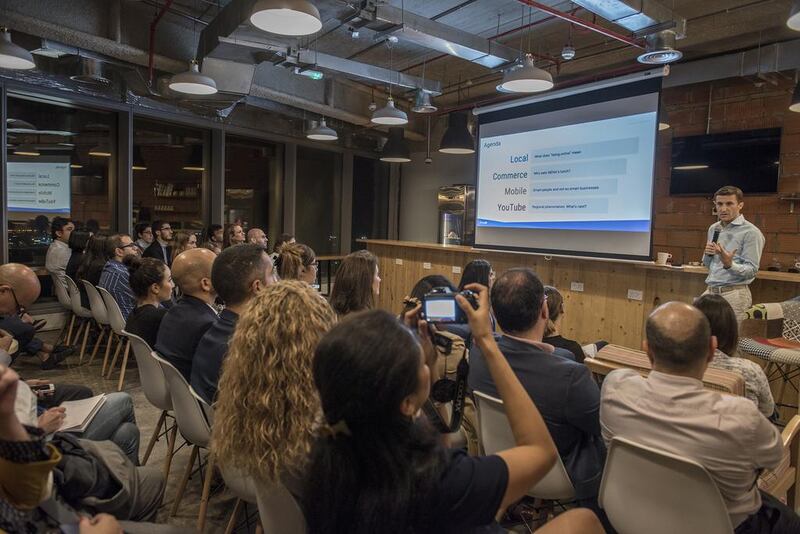A more appropriate image would have been a scene with tumbleweed rolling through, says Adam Kwasniewski, but after considering it he settled on a map instead.
The image the Google Mena head of SME marketing refers to featured in a presentation he delivered last month on the basics of digital marketing at GlassQube Coworking on Abu Dhabi’s Reem Island. He used the map – with its tiny green spots marking UAE businesses with an online presence – to illustrate how skeletal it looked compared to European cities, which are literally carpeted in colour.
According to Mr Kwasniewski, the UAE has 15 times fewer businesses online than any other market in the European Union.
He set out a scenario to illustrate his point to the audience, which was made up of aspiring and established entrepreneurs, as well as private and public sector employees.
“Let’s imagine that I need a light bulb. I live in Dubai and I was looking for a specific model that goes with my lamp. And the only shop that was capable of showing [if it] had it in stock was Ikea,” says Mr Kwasniewski.
“I am absolutely sure that between my place and Ikea there are at least 57 shops that have it. They just failed to inform me that it was there. If their phone number is not active and I have no clue where they are, this is a missed opportunity. And it’s not really super-costly. If you are not a single-service business, just make sure people understand what your products are or what you have in your store.”
Hicham Houmane, 31, from Morocco, attended the event to pick up some tips for marketing his automatic online Arabic proofreading tool called Hamza, which corrects spelling and grammar mistakes and gives users style solutions. It has launched a couple of test versions, but the official site is expected to go live on Wednesday of next week.
“Right now we’re getting ready to pick up speed because we are getting ready to launch at least a limited version and we need a more complete marketing plan, so I was just basically getting ideas,” he says.
“So far we have competed for some very low-value key words and that allowed us to reach a lot of audience for a nominal fee of something less than Dh30 a day. Most of our key words were in Arabic and they were around spelling mistakes and proofreading. It’s not something that has a lot of competition. So it is not something everybody can do, but for us, it worked.”
The audience heard that Google digital marketing packages can cost upwards of US$3,000 a month, an expense his early-stage start-up cannot yet afford.
“As a start-up we’re not anywhere near that yet. But I see the value of it. Even without that there are certain things you can get for free,” says Mr Houmane.
“When you sign into Adwords, there is an offer they give you where you can get contact with somebody working in Google on how to set up your ad campaign. And this is done for free for anybody once they set up their first account. If you take advantage of that, there is a Google AdWords course also available for free, which is something that is also useful.”
Audience member Miral Zalabani, 37, is the chief executive and founder of Wellabina, an app she aims to launch in May that will help people find, review and book wellness and beauty appointments. She is interested in using the paid-for product once her business is established.
“I was hoping to find out about the tools that Google can help the upcoming companies – because I am not even an early-stage start-up, so what can Google do for me? Apparently [nothing] yet. You have to be an early-stage start-up,” says Ms Zalabani, who is Egyptian but was born and raised in Abu Dhabi.
Mr Kwasniewski suggests that people at Ms Zalabani and Mr Houmane’s stage should never pay for advertising, and should instead make use of free tools and focus on their products.
“Secondly, a testing environment, from my perspective, is super-critical. If you are ready to go live, make sure you can be easily found right across mobile devices. Don’t forget that part,” he says.
Finally, businesses should get to know their customers to learn how they can scale up.
“The best piece of advice they gave was do not pay for advertising until No 1, you understand what you are asking for from a digital marketing agency,” says Robyn Brazzil, a programme manager with StartAD, a startup incubator based in New York University Abu Dhabi.
“And No 2, you have to know your customer first. Paying for a bunch of advertising [without doing that first] is just going to get you a number of clicks that don’t convert. People don’t understand that it’s converting the people who come to your platform, not just creating general awareness.”
business@thenational.ae
Follow The National's Business section on Twitter






